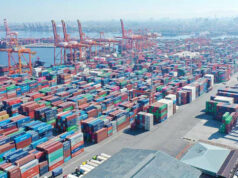AGRICULTURE Secretary William D. Dar said his regional officers have been authorized to realign budgets to facilitate the transport of hogs to Metro Manila, in order to augment the capital’s pork supply and head off a potential food-inflation crisis.
In a statement Friday, Mr. Dar said Agriculture regional directors have been directed “to mobilize available resources in transporting hogs, and other meat products. He said spending clearance also covers the hiring of “reefer vans, trucks, vessels, (and) cold storage.”
The regional directors have also been tasked to negotiate with hog producers and logistics partners to transport surplus stocks of pork from parts of the Visayas and Mindanao whih are free of African Swine Fever (ASF), the hog disease that has decimated the Luzon animal population.
“We have to map out sources of hogs, lead the negotiations between farmers and traders, and facilitate documentary requirements such as certifications and local transport permits so we can bring in cheaper hogs and pork products immediately to Metro Manila,” Mr. Dar said.
President Rodrigo R. Duterte recently signed Executive Order (EO) No. 124 which implemented a price cap on pork and chicken products sold in Metro Manila public markets, in force for 60 days.
The Departent of Agriculture (DA) recommended the price caps be implemented starting Feb. 8, Monday, to provide the industry a “grace period” to ispose of stocks acquired before the EO was signed.
Under EO 124, the retail price of pork shoulder (kasim) is capped at P270 per kilogram, while the price of pork belly (liempo) is at P300 per kilogram. The price celing for whole chicken is P160 per kilogram.
The EO was signed after pork prices topped P400 per kilogram in Metro Manila. — Revin Mikhael D. Ochave



